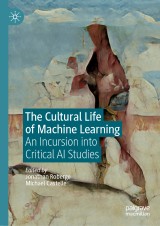Details

The Cultural Life of Machine Learning
An Incursion into Critical AI Studies|
69,54 € |
|
| Verlag: | Palgrave Macmillan |
| Format: | |
| Veröffentl.: | 30.11.2020 |
| ISBN/EAN: | 9783030562861 |
| Sprache: | englisch |
Dieses eBook enthält ein Wasserzeichen.
Beschreibungen
This book brings together the work of historians and sociologists with perspectives from media studies, communication studies, cultural studies, and information studies to address the origins, practices, and possible futures of contemporary machine learning. From its foundations in 1950s and 1960s pattern recognition and neural network research to the modern-day social and technological dramas of DeepMind’s AlphaGo, predictive political forecasting, and the governmentality of extractive logistics, machine learning has become controversial precisely because of its increased embeddedness and agency in our everyday lives. How can we disentangle the history of machine learning from conventional histories of artificial intelligence? How can machinic agents’ capacity for novelty be theorized? Can reform initiatives for fairness and equity in AI and machine learning be realized, or are they doomed to cooptation and failure? And just what kind of “learning” does machine learning truly represent? We empirically address these questions and more to provide a baseline for future research.<div><br></div><div>Chapter 2 is available open access under a Creative Commons Attribution 4.0 International License via link.springer.com.<br></div>
<br>
<div><p><b>Jonathan Roberge</b> is an Associate Professor at the Institut National de la Recherche Scientifique in Montreal, Canada. He funded the Nenic Lab as part of the Canada Research Chair in Digital Culture he has held since 2012. His most recent edited volume is <i>Algorithmic Cultures </i>(2016).</p>
<p><b>Michael Castelle</b> is an Assistant Professor at the University of Warwick’s Centre for Interdisciplinary Methodologies, UK and a Turing Fellow at the Alan Turing Institute, UK. He has a Ph.D. in Sociology from the University of Chicago and a Sc.B. in Computer Science from Brown University.</p>
<p><br></p></div><br><div><br></div>
<p><b>Michael Castelle</b> is an Assistant Professor at the University of Warwick’s Centre for Interdisciplinary Methodologies, UK and a Turing Fellow at the Alan Turing Institute, UK. He has a Ph.D. in Sociology from the University of Chicago and a Sc.B. in Computer Science from Brown University.</p>
<p><br></p></div><br><div><br></div>
<p>This book brings together the work of sociologists and historians along with perspectives from media studies, communication studies, cultural studies, and information studies to address the origins, practices, and possible futures of contemporary machine learning. From its foundations in 1950s and 1960s pattern recognition and neural network research to the modern-day social and technological dramas of DeepMind’s AlphaGo, predictive political forecasting, and the governmentality of extractive logistics, machine learning has become controversial precisely because of its increased embeddedness and agency in our everyday lives. How can we disentangle the history of machine learning from conventional histories of artificial intelligence? How can machinic agents’ capacity for novelty be theorized? Can reform initiatives for fairness and equity in AI and machine learning be realized, or are they doomed to cooptation and failure? And just what kind of “learning” does machine learning truly represent? Contributors empirically address these questions and more to provide a baseline for future research.</p><p><b>Jonathan Roberge</b> is an Associate Professor at the Institut National de la Recherche Scientifique in Montreal, Canada. He funded the Nenic Lab as part of the Canada Research Chair in Digital Culture he has held since 2012. His most recent edited volume is <i>Algorithmic Cultures </i>(2016).</p><p><b>Michael Castelle</b> is an Assistant Professor at the University of Warwick’s Centre for Interdisciplinary Methodologies, UK and a Turing Fellow at the Alan Turing Institute, UK. He has a Ph.D. in Sociology from the University of Chicago and a Sc.B. in Computer Science from Brown University.</p><p>Chapter 2 is available open access under a Creative Commons Attribution 4.0 International License via link.springer.com.<br></p><p><br></p>
<p>Offers an empirically-based discussion of machine learning and artificial intelligence technologies in society</p><p>Provides new histories of machine learning and artificial intelligence rooted in humanities and social sciences approaches</p><p>Places technologies in conversation with central theories and topics in the humanities and social sciences</p>

















